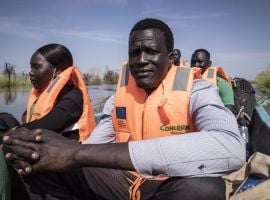
Knowledge Hub
Inside the largest refugee camp in the world

Jemima Jewell, a trustee of Concern UK, visits Cox’s Bazaar - the world’s largest refugee camp where almost a million people are now living, having been forced to flee their homes. Here, she vividly narrates her experience and the people she met, and outlines what is being done to help the Rohingya refugees in Bangladesh.
The camp stretches as far as the eye can see. Makeshift houses - mostly bamboo and tarpaulin - perch on the side of perilously steep slopes. They will surely not be able to withstand the Monsoon rains which will inevitably lash down in the coming months.
We are visiting the huge refugee camp in Cox's Bazaar, Southern Bangladesh, which houses nearly a million Rohingya people who have fled their home country of Myanmar. Having escaped persecution, they now find themselves facing a difficult and uncertain future.
Concern has supported families in the camp since 2017, and we visit some of their homes. Sitting on the floor in Lu Min’s* house, she tells us about the awful violence - the threat to their village, their family, their lives - that forced her, along with her husband and seven children, to leave and make the long journey on foot to Bangladesh. It is nothing short of heartbreaking. Do they want to return, we ask? 'Not until it is safe'.
Concern’s work in the camp is diverse, but it centres around a number of Outpatient Therapeutic Centres. The OTC is a model of specialist nutritional support that was pioneered by Concern. Many people visit the OTC on a regular basis; they receive advice and nutritional supplements, but the focus is very much on support for mothers to care for their children in the home.

A reality they never would have chosen
We visit a young couple, Monir* and Azara*. Their baby - their first - is just eight months old. We are shown his record card from Concern's Outpatient Therapeutic Centre where his vital statistics were recorded - the circumference of his middle upper arm; the level of oedema; his weight. His weekly attendance at the OTC has just finished. Previously malnourished, he has now reached his target weight. With his parents clearly delighted by this, we all smile as we watch him gurgle and play on the mat with his father: a glimpse of joy and normality in a situation his parents would never have chosen for their son.
Care, commitment and compassion from Concern
Of course, nutritional support is by no means the only pressing need in the Rohingya refugee community. Water and sanitation, health, provision of basic goods - these are all required. The complexity of the crisis, and the scale of the coordination required to address this – from Concern and the humanitarian agencies they work alongside - is simply breathtaking. As a Trustee of Concern (UK) for five years, I know well the dedication of the Concern staff, but I left Cox’s Bazaar with an even deeper respect for the careful, committed and compassionate way in which Concern ensures aid delivers maximum effectiveness, whilst never losing its human touch.

It is challenging to imagine what the future holds for the displaced Rohingya people. Their resilience in the face of adversity is astounding, but no matter their willingness to work, right now they are fundamentally limited in their ability to provide for their families. Every square metre of viable land is covered with housing – and without land, there can be no crops, and very little trade or income. Support from Concern and others working on the ground will remain vital to secure their health and dignity.
*Names have been changed for security reasons
Jemima Jewell
Concern Worldwide Trustee






